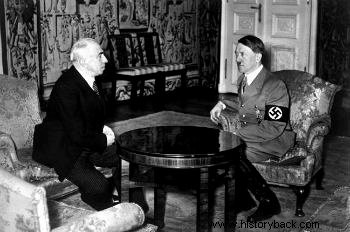The causes that contributed to the start of World War II there were many.
We can highlight the Great Depression, discontent with the Treaty of Versailles, fascist and Nazi ideologies, and finally, Japanese expansionism.
Main Reasons for the Second World War
Great Depression
The Great Depression, whose trigger was the crash of the New York Stock Exchange, marked the failure of four thousand banks in the United States alone.
The country registered 14 million unemployed and national income fell by 50%. Americans' wages fell by 40%.
The financial problems of the United States, the hard core of the world economy, were reflected in the rest of the world.
In Great Britain, which suffered a 70% reduction in exports, three million workers were unemployed. In Italy, there were 1.3 million, and in France, 3 million.
Hard hit, Germany suffered a 39% drop in industrial production and 7 million Germans were unemployed. Likewise, one of the highest inflations in the history of capitalism was recorded.
Treaty of Versailles
Parallel to the crisis, the German government felt the effects of the territorial reorganization imposed by the First World War and the humiliating directives of the Treaty of Versailles.
At the end of the First World War, the supremacy of world power was divided between Great Britain, France and the United States.
England and France controlled hundreds of African and Asian colonies; and the United States 50% of world capitalist production.
In contrast, Italy and Japan were dissatisfied with the territorial division.
Read more :
1929 crisis
Treaty of Versailles
Japanese and Italian Invasions
 Japanese soldiers invade a Chinese city
Japanese soldiers invade a Chinese city
Japan, with 70 million people confined in a small territory, sought to solve the supply of minerals and oil. According to the Japanese, the solution lay in the invasion of Manchuria and several Chinese territories in 1931.
In Italy, under the command of Benito Mussolini between 1922 and 1943, there was an invasion of Abyssinia, today Ethiopia, in Africa.
Diplomatic negotiations by France and Great Britain were used to try to avoid a new war. The two nations, however, were satisfied with the territorial redefinition and, in addition, they dictated the rules in the League of Nations, precursor body of the UN (United Nations).
Without armed confrontation, the body was limited to insignificant repressions and, in the case of the invasion of China, only to moral support.
Adolf Hitler and Nazism
In Germany, with Adolf Hiltler acting between 1889 and 1945 in power, the country is going through a process of strengthening the army, which reached 800,000 men. This number was 700,000 soldiers above the threshold defined in the Treaty of Versailles.
The first major annexation by the Germans took place in 1936, when Austria was taken on the grounds of uniting the Aryan race. Then, the annexation of the Sudetenland, belonging to Czechoslovakia, would take place in 1938.

Hitler tells Emil Hácha, president of Czechoslovakia, that Germany would invade his country and it was better not to resist
In Germany, these reasons were combined with Nazism, which held Jews responsible for the ills suffered by the German people.
Under Hitler's patronage, the war began with the surprising invasion of Poland in 1939. In Europe, it would only end on May 8, 1945, and in Asia, with the surrender of Japan in September 1945.
The Second World War would end with the death of 45 million people.
- World War II
- Beginning of World War II
- Consequences of World War II
- Main Battles of World War II
- D-Day - World War II
- Brazil in World War II
- Films about the Second World War
- 6 Films About Hitler, the Dictator of Nazism
- Questions about the Second World War
